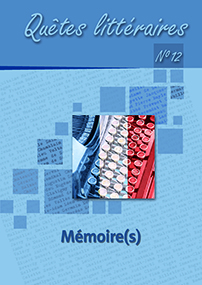Une dialectique de la mémoire et de l’oubli : Hiroshima mon amour de Marguerite Duras
The dialectics of memory and oblivion: Marguerite Duras’ Hiroshima mon amour
Author(s): Anna LedwinaSubject(s): Language and Literature Studies, Literary Texts, Studies of Literature, French Literature, Theory of Literature
Published by: Katolicki Uniwersytet Lubelski Jana Pawła II, Instytut Filologii Romańskiej & Wydawnictwo Werset
Keywords: Marguerite Duras; memory; oblivion; love; past; repetition
Summary/Abstract: Hiroshima mon amour depicts tight relations between memory and oblivion. The novel’s love story takes place in France’s collective memory, but it also refers to the individual memory of a woman evoking past events. Consequently, the encounter with another human being (a man) allows her to confront her personal trauma. This confrontation can be perceived as a quest for one’s own identity and history, i.e. the alienation history of an individual who – due to an unhappy love affair – cannot escape either the past or oblivion. The permeation of these two notions is emphasised by diverse time perspectives which overlap each other, allowing for an intertextual reading of Duras’ script. Hence, whereas the past revives the memory of painful events to which the writer constantly returns, oblivion can be considered a positive value, which – despite its connection to existential void – opens up a possibility of a new life and invites thoughts concerning a promising future.
Journal: Quêtes littéraires
- Issue Year: 2022
- Issue No: 12
- Page Range: 73-84
- Page Count: 12
- Language: English, French

